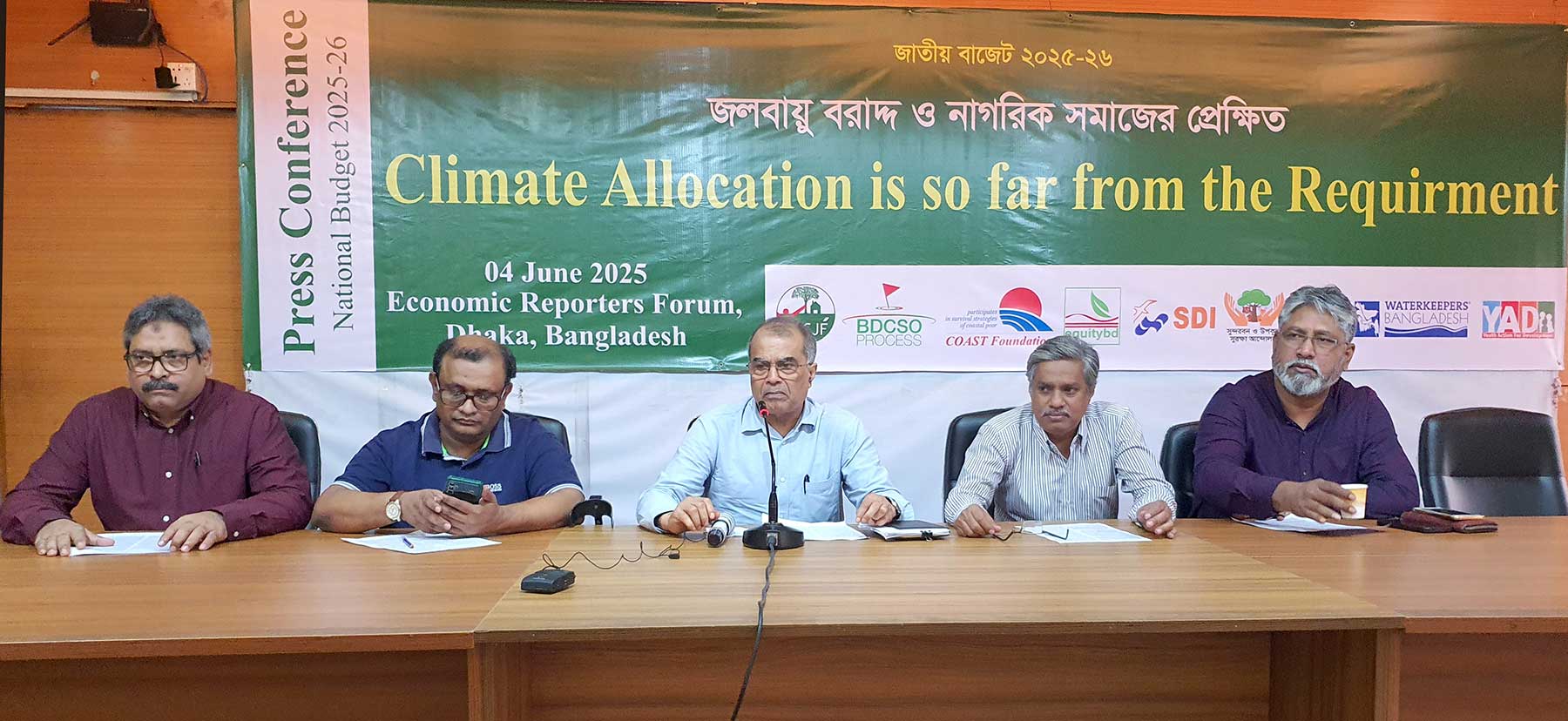Staff Correspondent
Published:2025-06-04 16:17:13 BdST
Call to fill deficit budget by bringing back laundered moneyClimate allocation only 0.67pc of GDP; unacceptable and inadequate
Climate allocation in the recently unveiled budget is totally unacceptable, inadequate and will create obstacles to moving forward with our sustainable economic development.
Considering the relevance of sustainable economic development and ongoing climate vulnerability, initiatives should be taken to implement the adopted plans based on own resources, and the minimum allocation of 3% of GDP for climate finance in the national budget should be reconsidered.
And to address the budget deficit, initiatives should be taken to bring back laundered money, and corporate taxes should be increased rather imposing unnecessary taxes indirect taxes on the people.
The speakers said this in a press conference on "Climate Allocation in the National Budget-2025-26 and Civil Society Perspective" organized by EquityBD, BDCSO Process, COAST Foundation, Youth Actin Network, Water Kepers Bangladesh, Sundarban Surakkha Andolon, SDI, Udayan, and Bangladesh Climate Journalist Forum in Dhaka today, at the Economic Reporters Forum, Dhaka.
Executive Director of COAST Foundation, Mr. Rezaul Karim Chowdhury, moderated this press conference. M.A. Hasan; Head of Climate Change, COAST Foundation presented the keynote.
Mr. Sharif Jamil; Chief Executive of Water Keepers Bangladesh, Mr. Kausar Rahman; President of Bangladesh Climate Change Journalists Forum (BCJF), Mr. Nikhil Chandra Bhadra; Coordinator, Sundarbans Protection Committee, Mr. Motahar Hossain; Secretary, Environmental Journalist Forum, Mr. Omur Faruk Bhuiya and Mr. Ahsanul Karim Babor from EquityBD, Mr. Mostafa Kamal Akand; Coordinator of BDCSO Process, Mr. Montaher Arafat; President, Youth Action for Development and others spoke as panel speakers.
M Rezaul Karim Chowdhury mentioned the intensifying frequencies of natural disasters and its direct negative impacts on the life of the coastal population.
He urged reconsideration of the climate budget allocation, constructing stone-based embankments, creating coastal natural barriers and ensuring participatory governance, and making strategic investments that serve the interests of vulnerable populations.
Sharif Jamil stressed that climate change is a current, not future, crisis. He urged a stronger focus on water, air, and soil management, transboundary river governance involving Bangladesh, India, Bhutan, Nepal, and Pakistan, and environmental reassessment of mega projects.
He also recommended adopting wealth taxes and the Polluter Pays Principle, which are successfully used in other countries. He advocated for Bangladesh to ratify the 1997 UN Watercourses Convention, which was previously overlooked. He emphasized that aligning with global water governance frameworks is critical for long-term resilience.
Kawsar Rahman, Climate Journalists Forum, stated that the budget largely follows an IMF-driven model, neglecting job creation and self-reliance.
He criticized the harsh increase in VAT to 15%, which disproportionately affects middle and lower-income groups, and warned of vulnerabilities in the banking sector due to excessive government borrowing.
Motahar Hossain reflected on past underperformance, stating that even the limited climate funds were poorly implemented and monitored.
Nikhil Chandra Bhadra lamented the postponement of key coastal projects, including BDT. 961 crore water preservation initiative in Bagerhat, Khulna, and Satkhira.
He called for district-wise budget allocations, prioritizing vulnerable coastal regions.
Ahsanul Karim Babor, highlighted the alarming trend of money laundering, estimating that over BDT. 280,0000 crores were laundered from 2009 to 2023.
He called for full implementation of the Money Laundering Prevention Act, coordination among the 7 mandated agencies, and international cooperation for asset recovery.
Montahar Arafat emphasized the need for youth participation and skill development, and allocation should be made by considering local vulnerability and demands.
Omour Faruq Bhuiyan, raised concerns regarding the heavy reliance on indirect taxation, which constitutes 80% of revenue sources.
He warned that such tax structures exacerbate inequality and poverty, citing research showing that a 1% increase in indirect tax could raise poverty by 0.42%. He also criticized the NBR reformation process, enacted without stakeholder consultation.
M. A. Hasan, in his keynote presentation speech, said that Socio-economic inequality may not reflect a sustainable economy. The proposed budget for the fiscal year 2025-26, the climate-related ministries' allocations are 41 lakh 2 thousand 8 hundred 97.0 crore taka, which is 10.07% of the total allocation and 0.67% of GDP.
This allocation is unplanned and inadequate against the $19 billion per year requirement of the long-term climate plan. He called for reconsideration of the minimum 3% of GDP allocation for climate finance in the national budget.
Unauthorized use or reproduction of The Finance Today content for commercial purposes is strictly prohibited.


